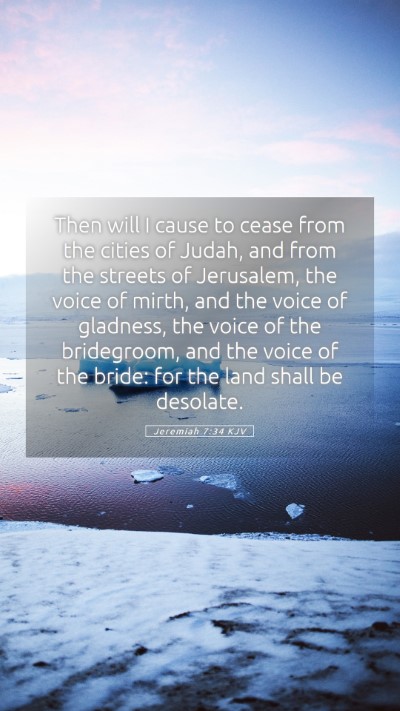Understanding Jeremiah 7:34: A Comprehensive Commentary
Jeremiah 7:34 states: "Then will I cause to cease from the cities of Judah, and from the streets of Jerusalem, the voice of mirth, and the voice of gladness, the voice of the bridegroom, and the voice of the bride: for the land shall be desolate." This verse encapsulates God's judgment against Judah for their persistent unfaithfulness and idolatry. Below, we summarize insights from public domain commentaries by Matthew Henry, Albert Barnes, and Adam Clarke to enhance your understanding of this poignant scripture.
Contextual Overview
This verse comes in the midst of a larger discourse wherein the prophet Jeremiah declares the impending judgment on Judah due to their sinful practices. The wider context includes God’s call to repent and return to righteous living, reflecting His desire for His people to acknowledge their errors and seek His favor.
Commentary Insights
-
Matthew Henry's Commentary:
Henry emphasizes that the cessation of joy and celebration in Judah marks a significant and tragic consequence of their disobedience to God. The voices of mirth, such as those of weddings, signify life and joy; their loss indicates a time of mourning and desolation. God's withdrawal of these blessings illustrates the severe implications of turning away from Him.
-
Albert Barnes' Notes:
Barnes points out that the references to "the voice of gladness" and "the voice of the bridegroom and bride" are symbolic of the normal and celebratory aspects of life that will be removed as punishment for their iniquities. This verse serves as a poignant reminder of divine judgment and the social and cultural disruptions that follow unfaithfulness to God. The desolation foreseen is both physical and spiritual, highlighting the completeness of the judgment.
-
Adam Clarke's Commentary:
Clarke interprets the verse by stressing the significance of covenant and communal joy in Israelite society. The voices mentioned signify the covenant community's joy, and their cessation indicates that the relationship between God and His people has irrevocably broken down. The desolation of the land serves as a metaphor for the spiritual barrenness that results when divine truths are neglected.
Thematic Elements
This verse conveys several key themes that resonate throughout Scripture:
- Judgment: The verse is a direct proclamation of divine judgment against a disobedient nation.
- Loss of Blessings: The passage illustrates how turning away from God's ways leads to a loss of blessings and joy.
- Desolation: The imagery of desolation underscores the serious repercussions of sin, not only on individuals but on communities and nations.
Application of Jeremiah 7:34
For contemporary believers, this verse serves as a poignant reminder of the need for repentance and the consequences of neglecting one’s relationship with God. The absence of joy in life, metaphorically expressed through the loss of celebratory voices, can serve as a warning against complacency in spiritual matters. Reflecting on this passage prompts personal introspection regarding how one's actions may affect not only their own joy but also that of the community.
Cross References
- Isaiah 24:7-11: Discusses the desolation of the earth due to transgressions.
- Revelation 18:22-23: Describes the silence and destruction that comes as a result of divine judgment.
- Lamentations 5:15: Expresses the mourning over the loss of joy and gladness in Jerusalem.
In Conclusion
This commentary on Jeremiah 7:34 provides a multifaceted understanding of this solemn declaration regarding divine judgment. Through the insights of major biblical commentators, we can better appreciate the weight of this passage, its historical context, and its relevance to both ancient and modern audiences. Understanding this scripture not only enriches our Bible study insights but also invites deeper reflection on our personal walk with God.
As you engage in your Bible study groups or individual study, consider how Jeremiah's message can inform your understanding of Scripture and its applications in daily life.


